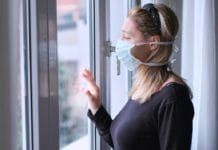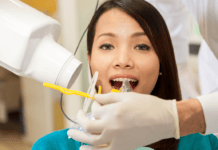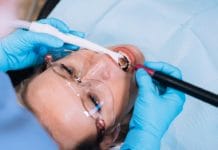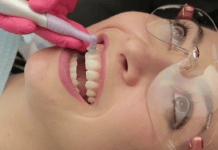Many dental hygienists are going through a crisis as our profession is filled with uncertainty, fear, anxiety, and sadness in the midst of a global pandemic. We are at a standstill with many of us out of work and unsure of when we will be able to start working again. During all of this, I have noticed a trend in asking questions about jobs outside of clinical dental hygiene.
What else is out there for a hygienist? I’d like to do something else outside of clinical hygiene. Do I need to go back to school? Am I qualified for other jobs? What kind of jobs are out there for dental hygienists outside of clinical hygiene?
As a hygienist who has made my way out of the op and now works full-time in marketing, I am hoping to share some of my own experience, as well as give encouragement for those looking to transition out of clinical hygiene.
Stay in or out of dentistry?
My out-of-the-op story started just a few years into working clinically as a hygienist. It wasn’t that I didn’t love dental hygiene; I truly did! I just began to grow tired of the physicality of the job and began to think of what other options were out there. As I began my search, I questioned whether I should pursue something in the dental industry, or completely restart and choose another profession entirely.
I began writing dental hygiene articles because I had always loved to write, and it seemed like a great way to apply my knowledge in dental hygiene to something outside of clinical dentistry. After a few articles, I knew I could contribute to the dental space in more ways than just as a clinical hygienist.
I became determined to find ways to share my dental hygiene knowledge and use some of the skills I had developed as a hygienist in other ways. I was extremely fortunate to come across a job for an oral care startup based out of Brooklyn, N.Y. They were looking for an RDH with writing experience and a bachelor’s degree, and I couldn’t believe that I had found something that completely aligned with what I was currently doing.
I flew out for an interview, and two weeks later, my husband and I moved across the country after being extended an offer. In full transparency, it was definitely an occupational culture shock, and it wasn’t always easy. Going from working in a dental office to working in a more traditional office was a huge transition. I would sit in meetings and have to google different marketing terms and abbreviations because I didn’t know what they meant.
But I was so excited to have found a job where I could apply my dental hygiene knowledge in a way that wasn’t clinical hygiene; I was eager to learn everything I could. Luckily, I had a great coworker on my team who would take the time to explain and teach me, so I was able to catch up quickly and became a valued member of the team.
I am no longer with this company, but my time with them allowed other doors to be opened. I have always dreamed of working remotely, and have finally found a marketing position with a company I have loved since my clinical hygiene days. Sometimes you just need to get your foot in the door and see what opportunities follow!
Foot in the door
So how does a hygienist even go about making that first move out of the op? It may sound simple, but you do just that − make the first move! I’d encourage you to start taking as many opportunities as you can to get some experience in things other than clinical dental hygiene. You may need to initially take a bit of a pay decrease to get your foot in the door or take an opportunity that you may not initially love.
My first non-hygiene gig was helping at a booth at a dental conference during a weekend while I was still working as a hygienist. It wasn’t glamorous, it didn’t pay well, and I had to sit on the train for an hour both ways. But it was enough to get my foot in the door and start making contacts with the reps at the booth.
If you are not in a place to dedicate time to an opportunity, start reaching out to fellow dental professionals you know who have made the jump out of clinical dentistry. Did anyone from your hygiene school become a rep or a professional educator? Do you know any hygienists who are teaching dental hygiene rather than practicing full-time? Reach out and see if they would be willing to chat with you about their experience! It’s so important to get as much insight as you can while getting your name out there and letting people know you are interested in opportunities outside of clinical hygiene.
You never know what may come from putting yourself out there! For example, one time early in my career, I reached out to a notable hygienist who was very established in her field and was at the time a director for a large dental company. I found her email on the internet and sent a very simple email asking if she would be willing to chat with me about her experience. I mentioned that I was looking to learn as much as I could about transitioning out of clinical hygiene. We ended up talking for two hours, and she offered me a position after working as a professional educator.
I am not saying this is normal or a guarantee, but I do hope it encourages you to begin to put yourself out there and begin reaching out to peers who are no longer in clinical hygiene. You never know what doors may open because of it!
You already have great qualifications!
Another common question is, “What if I am not qualified to do anything else other than clinical hygiene? Do I need to go back to school?” I would argue that dental hygienists are some of the most versatile, marketable professionals out there. Your skills likely extend further than just your ability to scale teeth.
Think about your daily routine as a hygienist. You demonstrate administrative abilities, extreme attention to detail, and have incredible time management skills. You recommend and “market” oral hygiene products to patients that you believe will help them achieve oral health. You work relatively independently, you are a self-starter, and you have exceptional people skills.
All of these skills you have developed as an RDH in clinical practice are skills you can take out of the op and into new roles! Don’t be discouraged and think that your list of skills start and end with cleaning teeth. You have mastered so much more!
As far as going back to school, it very much depends on what kind of job you are looking to get. It’s not uncommon for nonclinical positions to require at least a bachelor’s degree, so start looking at various jobs and see what they require. If most of the jobs you are looking at require a higher degree, it could be worth your time and investment if you have the goal of transitioning out of clinical dental hygiene.
At the end of the day, every job has its pros and cons. There is the potential that “the grass is always greener” scenario happens to you once you leave clinical dental hygiene. Being a practicing hygienist is rewarding in ways that a nonclinical job is not. You have the ability to change your patients’ quality of life and perception of their oral health, which is incredibly fulfilling. However, a nonclinical job can be much easier physically, as well as provide you with some more flexibility, such as working from home.
Also, you may be more likely to receive medical and retirement benefits as well as stock options if you are in a nonclinical salaried position. Also, one of the biggest differences is that as a hygienist, you likely will not “climb the ladder” in the sense that you will likely start and end your career at the same position. Working with a company, you have the chance to grow, get promoted, and take on more responsibilities.
Clinical dental hygiene can be an incredibly rewarding career! However, if you have always felt like maybe, just maybe, you wanted to branch out and try to apply your skills in a nonclinical way, I hope you are encouraged and feel confident to get out there and start going for it! You know so much more than you may think, and being a hygienist has given you a unique toolbelt of skills you can take with you into various jobs.
If you have always wanted to make the switch out of dental hygiene, use this time to make the jump, even if it’s a small one, into trying your hand at other opportunities. You may be surprised by what you find out there!












